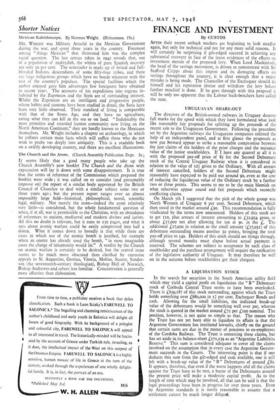The Church and the Atom. (Church Assembly Publication Dept. 2s.)
IT seems likely that a good many people who take up the Church Assembly's new booklet The Church and the Atom with expectation will lay it down with some disappointment. It is true that the terms of reference of the Commission which prepared the booklet were wide ; it was called on to consider (and presumably improve on) the report of a similar body appointed by the British Council of Churches to deal with a similar subject some two or three years ago ; but the present report ranges over an almost impossibly large field—historical, philosophical, moral, scientific legal, military. Not merely the atom—indeed the atom relatively very little—is considered, but the whole fundamental question of when, if at all, war is permissible to the Christian, with an abundance of references to ancient, mediaeval and modern divines and jurists. All this no doubt is relevant, but it runs to 130 pages, and what it says about atomic warfare could be easily compressed into half a dozen. What it' comes down to broadly is that while there are cases in which use of the atomic bomb is justified, for example when an enemy has already used the bomb, " in most imaginable cases the charge of inhumanity would lie." A verdict by the Church on atomic warfare is certainly to be desired, but the central issue seems to be much more obscured than clarified by extensive appeals to St. Augustine, Grotius, Vitoria, Molina, Suarez, Sander- son (the seventeenth-century theologian), Bishop Hall of Norwich, Bishop Andrewes and others less familiar. Concentration is generally more effective than elaboration.


































 Previous page
Previous page